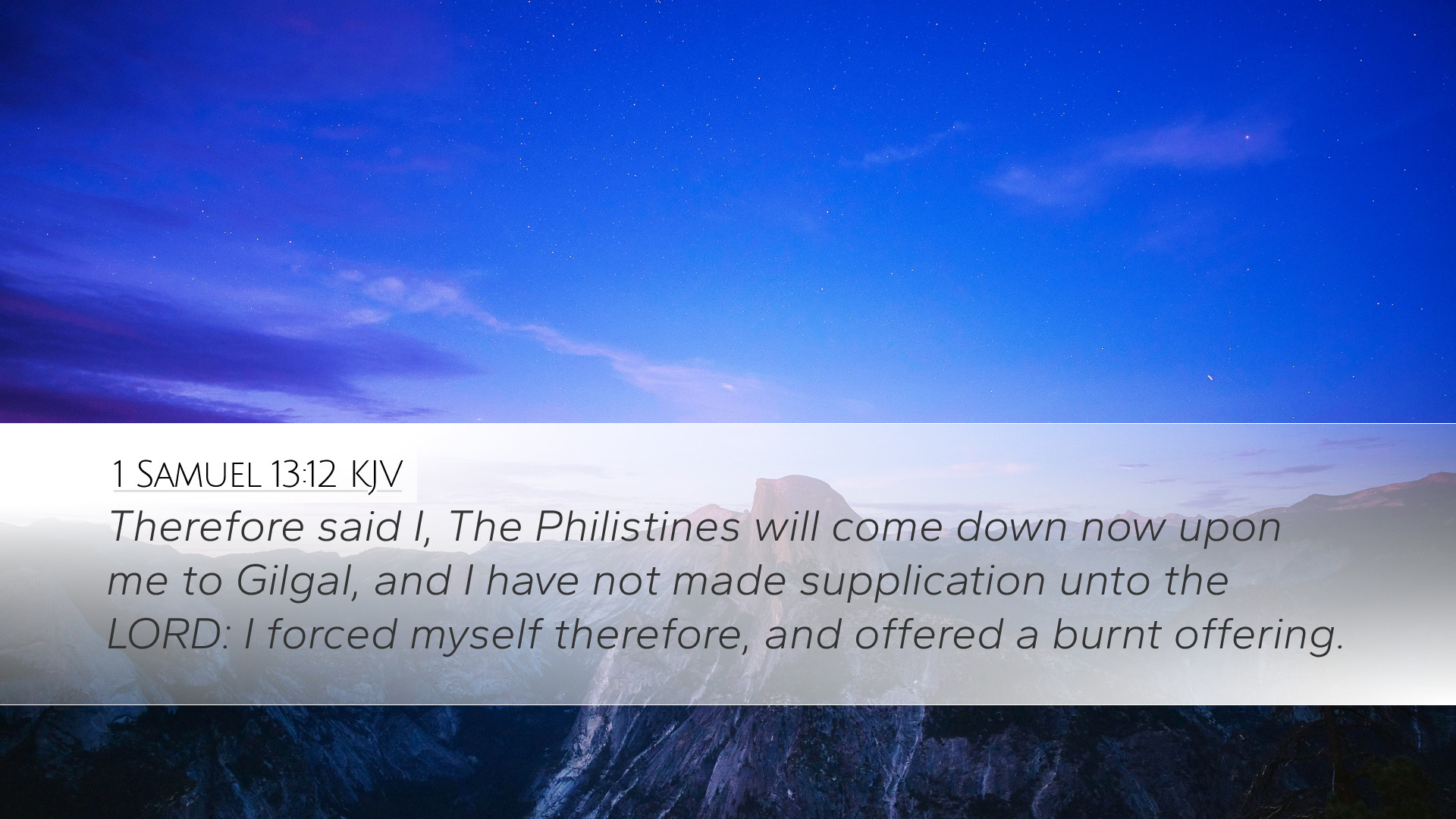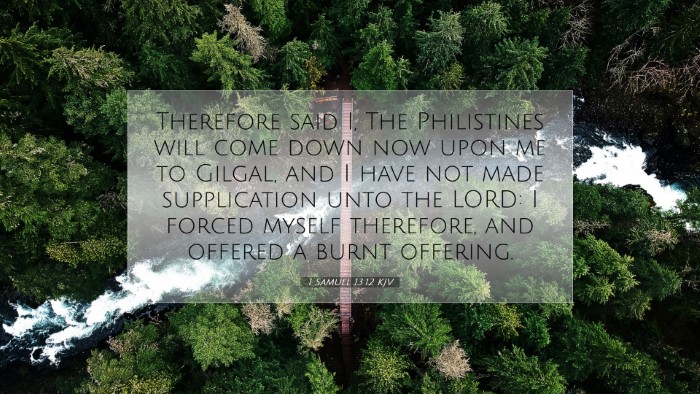Commentary on 1 Samuel 13:12
Verse Overview: 1 Samuel 13:12 captures a pivotal moment in the history of Israel's monarchy, illustrating the consequences of Saul's actions and decisions as the king. The verse states: "Therefore said I, The Philistines will come down now upon me to Gilgal; and I have not made supplication unto the LORD: I forced myself therefore, and offered a burnt offering." This encapsulates Saul's struggle, fear, and the immediate tension between his duties as king and his relationship with God.
Exegetical Insights
This verse is crucial for understanding the character of Saul and the dynamics of divine kingship in Israel. When examining the exhortations and consequences highlighted in various commentaries, we discern lessons pertinent for contemporary faith communities.
- Matthew Henry’s Commentary:
Matthew Henry emphasizes that Saul’s decision to offer sacrifices without waiting for the prophet Samuel indicates his impatience. He points out that Saul acted out of fear of the Philistine threat rather than reliance on God's instructions (1 Samuel 10:8). Henry expounds that Saul’s hasty action was a manifestation of a lack of faith, undermining the prophetic authority established in Israel. This violation of proper protocol illustrated how fear can lead to improper worship.
- Albert Barnes' Notes on the Bible:
Barnes discusses the deeper theological implications of Saul’s actions, noting that his offering was an act of usurpation. The implication is that sacrifices are to be offered by those designated by God. Saul, in his desperation, reacts to his circumstances without seeking divine guidance. Barnes highlights that this incident sets a precedent for God’s disapproval of Saul's leadership, eventually leading to his rejection as king. The emphasis is laid firmly on obedience over ritualistic actions.
- Adam Clarke’s Commentary:
Clarke places the actions of Saul within the larger narrative of Israel's struggles against their enemies, notably the Philistines. He comments on the gravity of Saul's decision, associating it with a breach in covenant relationship with God. Clarke argues that the name "Gilgal" holds significance as a place of remembrance for Israel’s covenant with God. Thus, Saul's sacrifice in this sacred space, done out of fear rather than faith, highlights the seriousness of violating covenant practices.
Theological Reflections
This verse reveals significant theological themes relevant to modern readers:
- The Nature of Authority:
The authority bestowed upon leaders and their accountability to God is a central theme. Saul's usurpation can be paralleled with contemporary issues regarding leadership and divine guidance within the church. Leaders are reminded to act according to God's commandments rather than human understanding or pressure.
- Faith vs. Fear:
Saul's impatience and fear can resonate with believers today. The struggle between acting in faith or succumbing to fear is a recurring theme in a believer's life. This narrative challenges individuals to evaluate their reliance on God amid uncertainty.
- Ritual vs. Relationship:
Saul's actions speak volumes about the difference between performing rituals and engaging in a meaningful relationship with God. It is a reminder that worship must be approached with genuine faith, not merely as a formality.
Practical Applications for Ministry
For pastors and church leaders, this commentary encourages the following applications:
- Emphasize Waiting on God:
Encourage congregations to embrace the discipline of waiting for God's timing in their lives, rather than rushing into decisions based on fear of circumstances.
- Foster Accountability:
Create systems in the church for accountability among leaders, ensuring that decisions align with Scripture and are bathed in prayer.
- Promote Authentic Worship:
Highlight the importance of sincere worship that stems from a relationship with God, challenging the congregation to move beyond mere traditions.
Conclusion
1 Samuel 13:12 serves as a profound reminder of the necessity of faithfulness in our walk with God, particularly for those in positions of leadership. The lessons drawn from Saul's failings are not merely historical; they resonate within the church today, inviting believers to reflect on their spiritual posture and relationship with the Almighty.


